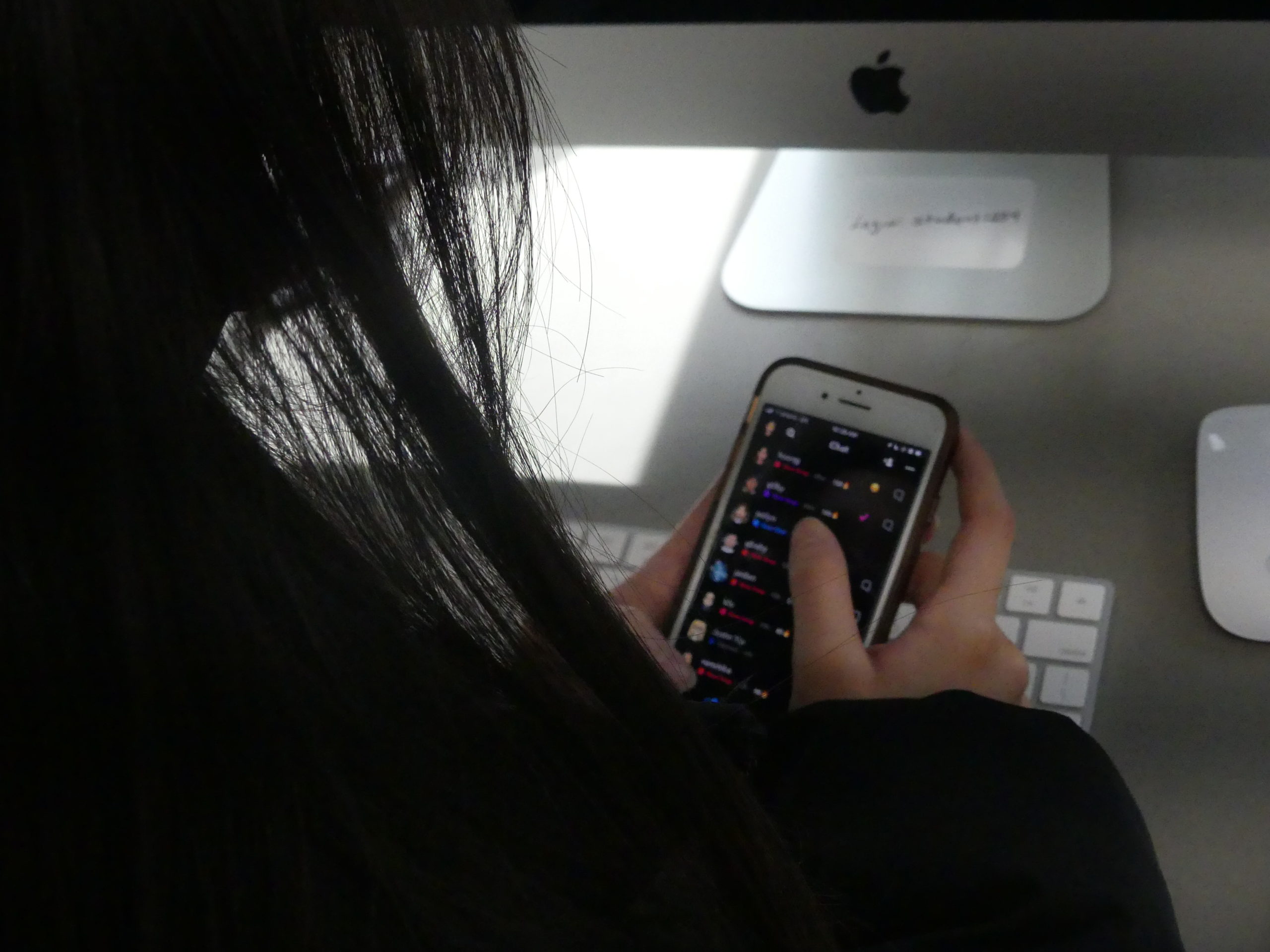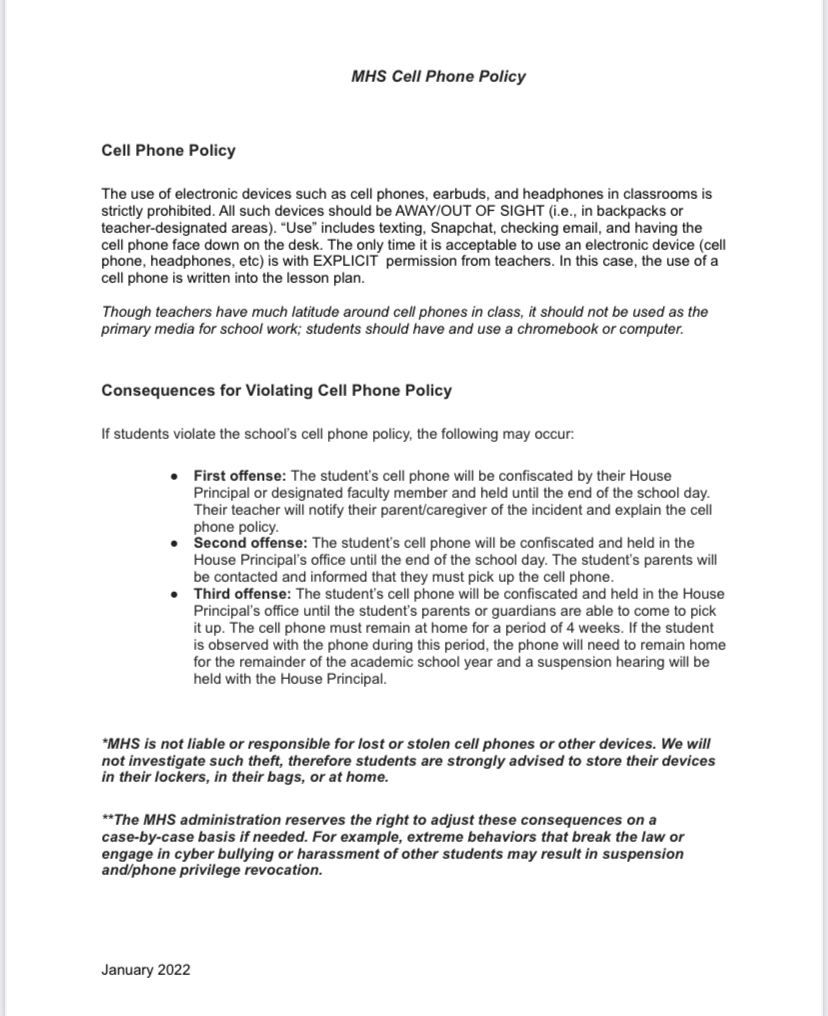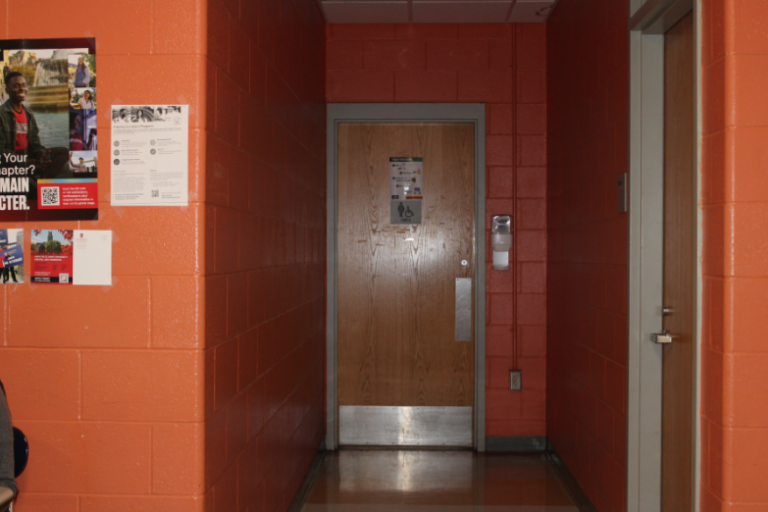
Gabriella Ilebode and Joy Lugo Morales also contributed to this article.
Returning to full in-person school after a year of remote learning and half-year of hybrid education proved a difficult transition for students and staff alike. One of the main struggles among them was the increased use of cell phones during school hours.
To help with the transition, Malden High School administration created a new phone policy. Under it, students are barred from using their phones during class. If they are caught with their phones the first time, they will have it taken away until the end of the day. The second time they have it taken away, the students receive a phone call home, and should it keep happening, it can even lead to a suspension. As a result, this has created a lot of tension between students and staff. As of now, the phone policy exclusively affects 9th grade CP students.
Freshman Jaden Huynh said that on his way to class, his peers “were already talking about it. A teacher pulled up the slideshow and everything; it was a Powerpoint [shown by] my teacher for math.”
“I found out through Snapchat, which is odd, but then we talked about it in homeroom when our homeroom teacher brought it up. It was just a screenshot of the email that one of the teachers sent out,” freshman Huong Ly stated.

Biology teacher Michael Berman explained that cell phones are “definitely a problem,” adding that “I tell students on the first day of class that I’m also on my phone and it’s really important to learn how and when to use it appropriately and when not to use it and when it’s a distraction. And for a lot of kids in their freshman year—it’s really distracting.”
Lucia Musilli, an English teacher, was also involved in the process of informing students about the policy, said “right now, the way I kind of interpret it and use it in my own classroom is that I give a warning out if I notice that there are students who are using it—even though it’s only… the second real full week where we’ve had it in place—I’ll say, ‘remember everybody, there’s a cell phone policy. You shouldn’t have your phones out’ and normally, I think kids respond right away and put it away. There are a few kids that might take it out again [but] I give them a second warning.”
She expressed mixed feelings about the policy, “as the policy states, we’re supposed to let the principal know in the moment, as it’s happening, and, I just—there’s too many students, too many needs to stop the class and refocus it around a behavioral issue that I think could be handled in the moment between teacher and student—especially in February because we’ve all established relationships with each other.”
“We know each other; I know my students. I know when they might be acting out or when they might be taking things too far. I don’t think that creating such a huge conflict and involving a third-party authority figure is necessary all the time.”
English Teacher Lucia Musilli
Musilli also mentioned that there is talk next year to ban the use of Airpods.
She believes the best approach would have been to implement it at the beginning of the year, “I feel like you can’t throw in a big mandate like that midyear for anyone.”
Berman brought up another idea, suggesting that products similar to the Yondr pouch – which locks in supplies for a set amount of time—be distributed, so kids could hold onto their phones but would not be able to access them until the end of the day.
“Or, if when they enter class, they can put their phone in the little thing on the door with a number so you know where your phone is,” he elaborated.
“I think for a lot of kids, it stresses them out not to have their phone and it supports them and their anxiety and, you know, it was just about not seeing their phone during the day,” Berman remarked.
“I think it’d be good to have something like that where it’s not just on the teacher to figure out what to do because currently, or at least before this new phone policy was enacted, it was just teacher discretion where some teachers were really loose with phones, and some teachers were really strict,” he continued.
Berman disclosed that the students reacted strongly. “Initially, they were really against it. Some of my classes were really upset and I was, like, ‘great. You should complain.’ You know, their voice matters.”
Having found out about it through his teacher, freshman Alex Van voiced his opinion: “It was very out of the blue, it was very random. I do not think that the cell phone policy [will] be effective. It isn’t reasonable.”
Ly added that “in today’s society, it’s like our personal stuff, it’s something that we need to have around. it makes us feel safe, and without it, it just makes us very self-aware of our surroundings.”
Senior Jasmine Luc also gave some perspective on what she thought about the situation, “I think that the policies are put in place because of the time spent being virtual. There’s such an issue with phones now because we were so used to being on our phones while being virtual, so now in class we have low attention spans and just want to be on our phones. I was a freshman before COVID happened, and I don’t remember it being such a problem.”
Another issue with this policy, from the seniors’ perspective, is that the policy fails to stay consistent. Sometimes it is enforced and sometimes it is not. Senior Sammi Nie believes “these policies will last but [will not] be enforced equally. They [will not] be removed but they will die out and come back at random times.”
She also finds that the school policies have gotten more harsh. “Even during freshman year the seniors at the time had their privileges [of leaving the building] revoked, and now students and even teachers get yelled at because students do not have a hall pass in their hand.”
While the use of cell phones in school is undoubtedly an issue that grew within the past year, the manner in which it was handled by Malden High administration has created its own controversy. It begs the question of whether there will be more changes in the near future.
“At the very least, it’ll be good to have the students’ opinion on things like this in general because we are the ones directly affected by the problems of this school,” said Luc.






